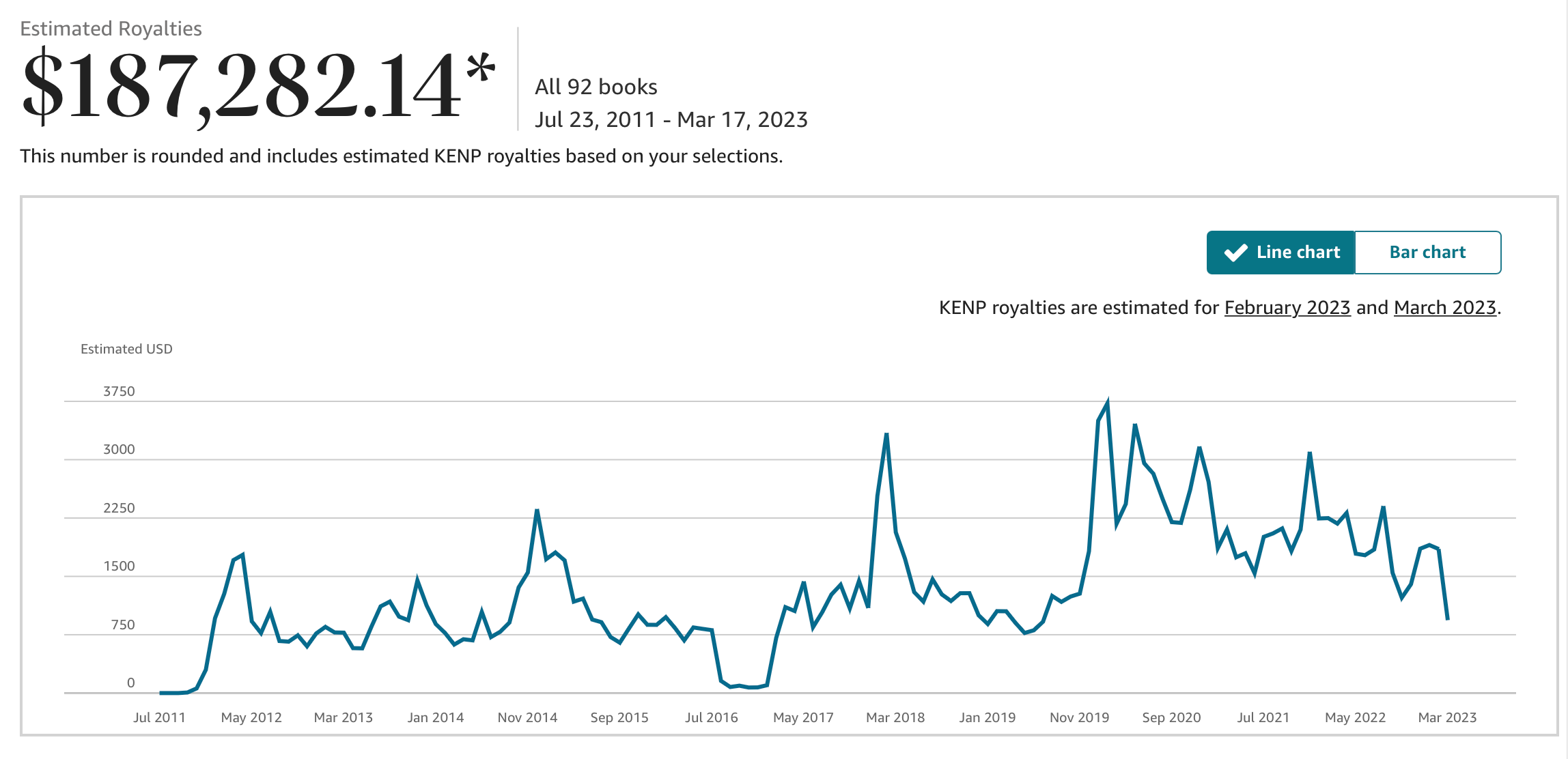Lessons from the one-man fiction factory
At 73 years old, James Patterson has sold more than 425 million copies of his 200 novels. Together with his co-authors, he has been the world’s best-selling author since 2001, ahead of J.K. Rowling, John Grisham, and Dan Brown.
His hardcover books account for one out of every 17 hardcover novels purchased in the United States. His prolific popularity has led to a sizable fortune. His annual earnings topped more than $80 million between June 2019 and June 2020, and he has an estimated net worth of $750 million.
Patterson’s writing started as a side-hustle
What many don’t realize is that Patterson’s writing started as a side hustle. He wrote his first novel, the Thomas Berryman Number, while working as a junior copywriter for the advertising agency J Walter Thompson in New York. The book got rejected by 31 publishers until it was finally published in 1976 and went on to win the Edgar award for best first mystery. Despite publishing his first book at 27, Patterson didn’t have a best-seller until he was 40.
The first 25 years of his career were spent at J.Walter Thompson, where he rose to become the youngest creative director and chief executive officer in the firm’s history, serving as chair from 1990–1996. It wasn’t until Patterson found success through his Alex Cross series with books such as Along Came a Spider, Kiss the Girls, and Jack and Jill; that Patterson decided to pursue writing full time.
At this point, he was 47 years old.
So how then did Patterson go from a hobbyist writer to one of the wealthiest and most well-known writers in the world? And how has he been able to churn out success after success over the last thirty years?
When you observe the approach he has taken, you discover he has built a kind of studio system for storytelling, more akin to how tv serials and blockbuster movies are created.
While lessons in high prose may be lacking, there is a lot to be learned from Patterson if you wish to entertain the masses and make money doing it.
1. He has a deep understanding of his audience’s needs
Patterson has a saying: ‘If you want to write for yourself, get a diary. If you want to write for a few friends, get a blog. But if you want to write for a lot of people, think about them a little bit. What do they like? What are their needs? A lot of people in this country go through their days numb. They need to be entertained. They need to feel something.’
Drawing on his experience in advertising, Patterson has gone to great lengths to develop an in-depth understanding of his audience. Working with his publishers, he has often commissioned his own audience surveys to better understand who his readers are, how to engage them, and the sort of stories his audience wants to read.
He is also a fan of audience testing and often provides a sample of his readers with advance copies of his novels to gain early feedback. On one occasion, Patterson changed the ending of a book — Cat and Mouse, after readers of advanced copies complained the ending was frustrating. This kind of testing is commonplace in Hollywood, but not in the traditional world of fiction publishing.
2. He creates the right product for his audience
Having gained a deep understanding of his audience, Patterson has been mindful to create novels that are fun, engaging, easy reads; a means of entertainment rather than works of great literature.
His novels are designed to be addictive in an almost physiological way, shifting rapidly between tension and resolution. Sentences are short. Chapters are rarely more than three pages long, and often end on cliffhangers. He avoids flowery descriptions, scene-setting, and backstories; preferring to launch readers into the action as quickly as possible.
‘I tend to write stories the way you want to tell them’ Patterson once said in an interview ‘I think I’m an okay writer, but a very good storyteller.’
Not unsurprisingly, his poor prose and grammatical guffaws have drawn their share of critics. Stephen King once dismissed Patterson as a ‘terrible writer’ who is ‘very, very successful.’ The head of one rival publishing house said Patterson’s method, ‘is a little bit paint by numbers. Does that make him bad? No, I think it makes him smart.’
Despite what critics say, Patterson has been able to combine creative story-telling and analysis of audience interests to create stories that resonate with a lot of people.
3. He has built the name “Patterson” into a recognizable brand
It is impossible to talk about how James Patterson produces successful books, without talking about how he markets them.
Drawing on lessons from the advertising industry, Patterson disrupted the traditional approach publishers used to promote new novels. His books are promoted with tools more commonly used for promoting television shows; such as television ads, billboards, and reader competitions.
His approach is best exemplified with the marketing strategy for “Along Came a Spider”, a novel centered around African American detective Alex Cross.
Patterson tried to persuade his publisher that the best way to get the book onto best-seller lists was to advertise aggressively on television. They instantly rejected his idea. At the time, large-scale TV advertising was rare in publishing, not only because of the cost but also for cultural reasons. The thinking was that selling a book as if it were a TV drama could turn off potential readers.
Taking matters into his own hands, Patterson wrote, produced, and paid for a commercial himself. Once his publishers saw the commercial, they agreed to share the cost of rolling it out. Along Came a Spider made its debut at number 9 on the New York Times hardcover best-seller list, ensuring its favorable placement near the entrance of bookstores, probably the single biggest driver of book sales. It remains Patterson’s most successful book to date.
Hundreds of thriller novels are published each year, but few become successful, let alone best-sellers. It’s likely that without those ads, Along Came a Spider never would have made the best-seller list, and that James Patterson would now be just another thriller writer.
4. When he finds a successful concept, he extends the brand
Having found success with Along Came a Spider Patterson quickly realized the potential of his Alex Cross character and wrote a second Cross novel, Kiss the Girls, in 1995. And then a third, Jack & Jill, in 1996. And then a fourth, Cat & Mouse, in 1997.
Today Patterson has turned Alex Cross into a successful franchise. There are currently 28 books in the series, and three Cross novels have been adapted into movies.
Having built Alex Cross into a successful series, Patterson then branched out into standalone books and has now diversified beyond thriller novels, to include young adult and even romance literature. Patterson has built a home entertainment brand and spread it far and wide.
He has built his reputation to such a point where fans have come to identify the Patterson name as a guarantee that they are buying a novel that they will not want to put down. And this seems to be the case regardless of whether he authors his books or not.
5. He has scaled his business through collaboration
Novels are a fundamentally unscalable product. As every writer knows, there are only so many hours in the day, and an author can only write so much. At the height of Patterson’s success readers were asking for more Cross novels.
Wanting to meet his audience’s growing demand, Patterson employed the help of co-authors. This kind of collaboration was second nature to Patterson’s days as an advertising exec, where he learned how to collaborate on creative work, and how to supervise creative people. His work resembles that of a TV showrunner, someone who sets the vision for a show, guides its tone, and oversees the team of writers scripting each episode.
To maintain creative oversight, Patterson sends his co-authors an outline of up to 80 pages for each book, and one of his co-authors will draft the chapters for him to read, revise and, when necessary, rewrite. When he first starts working with a new collaborator, a book will typically require numerous drafts.
Many of his co-authors have proven themselves to be good novelists but have failed to solve the problem of how to translate their storytelling skills into commercial success. By bringing together writers with his large fanbase, many struggling novelists have been able to establish full-time writing careers.
Take Michael Ledwidge, who co-authored the Michael Bennett detective series with Patterson. Patterson helped Ledwidge get his first book published and his writing career started. A few books later, Ledwidge had some critical acclaim but little commercial success. In 2003, Patterson suggested that they collaborate on “Step on a Crack,” his first Michael Bennett novel. The book went straight to number one on the best-seller list. In 2005, Ledwidge was able to quit his day job as a cable-splicer and became a full-time co-author for Patterson.
Patterson has been quoted saying “I have 500 pages of ideas for books, I couldn’t possibly do them all myself”. Once Patterson had built a readership and a following, he transitioned from a one-man band to more of a publishing studio, focusing on product design (plot outlines) and building the Patterson brand, while outsourcing production (the writing).
Novelist or brand manager?
Whatever your feelings about how Patterson crafts his work, what he has accomplished is impressive. As opposed to living out his second career as a retiring writer, he has built the Patterson name into a kind of publishing house, developing popular entertainment at scale.
And he appears to be relaxed about the critics of his ‘crafting’ process. Patterson clearly sees himself as an entertainer, creating stories that will resonate with a lot of people and writing them in an easy-read style.
Whether you believe him to be a novelist or a brand manager, by understanding his audience, building a recognizable brand, and scaling to meet demand; Patterson has provided an immense number of people with lots of reading entertainment.
As an aspiring writer myself, it begs the question — do I want to be a commercially successful writer or a niche intellectual one?





